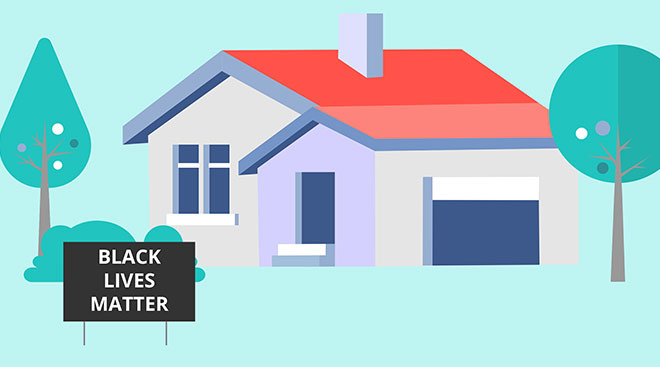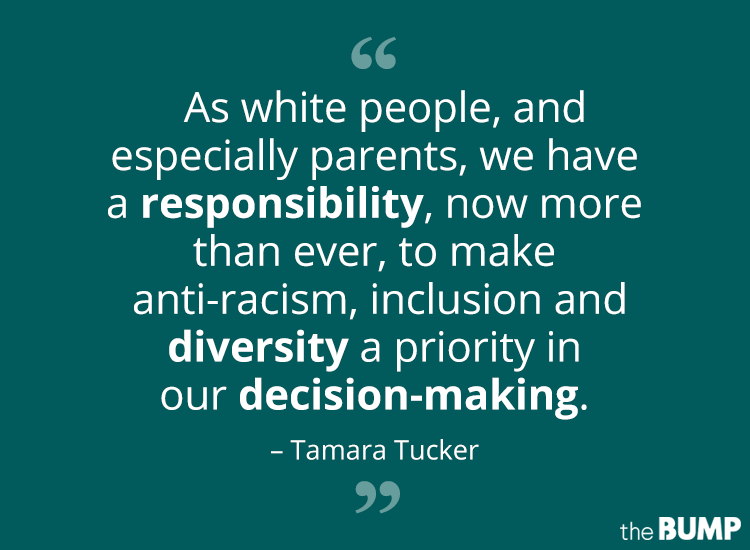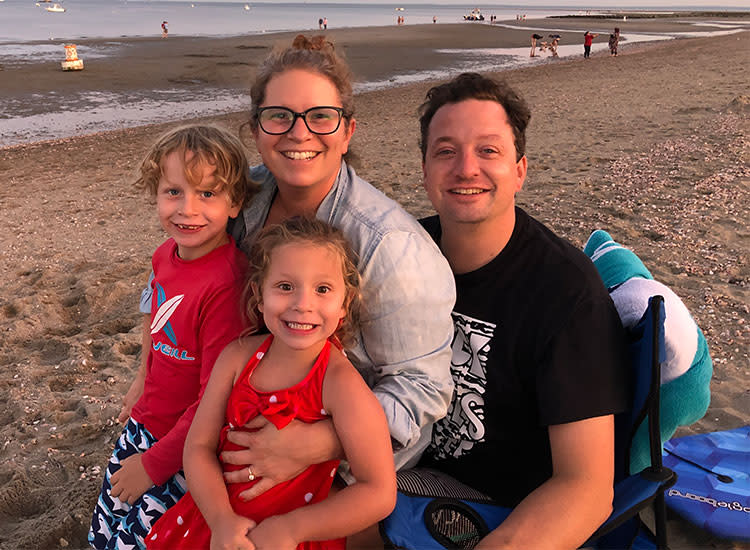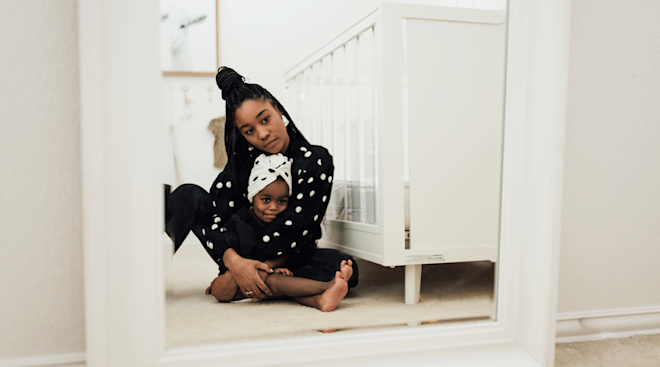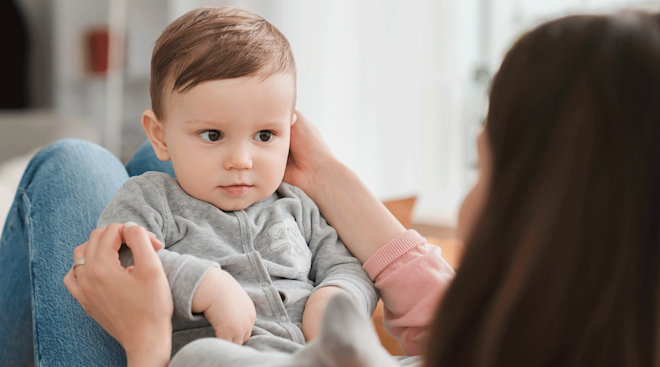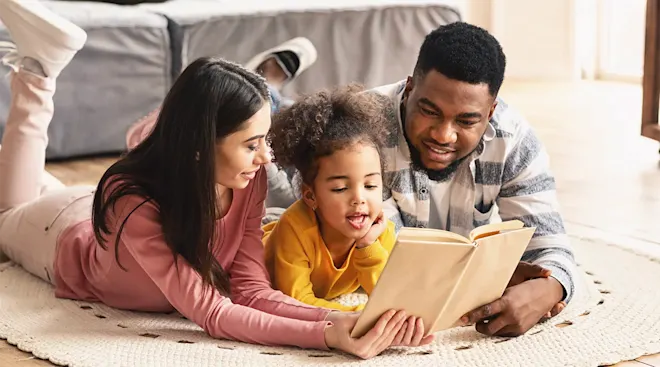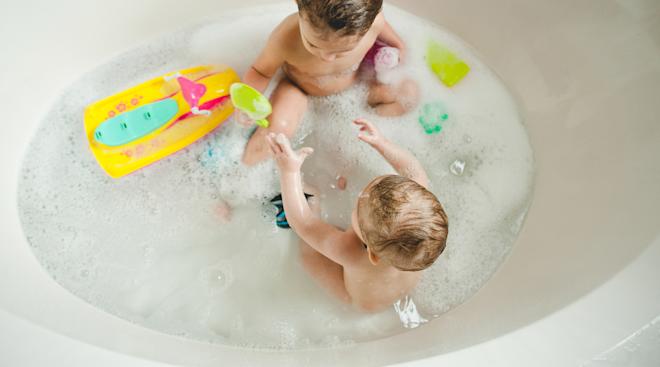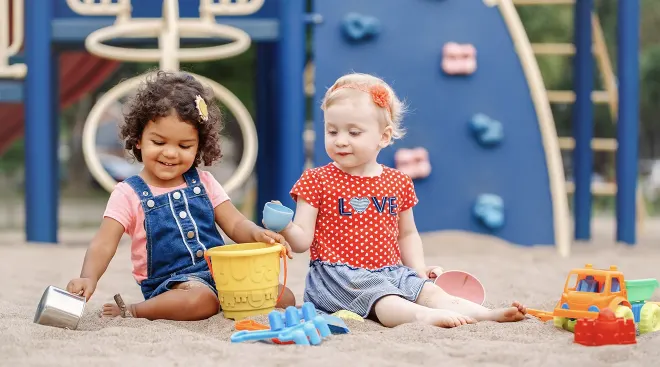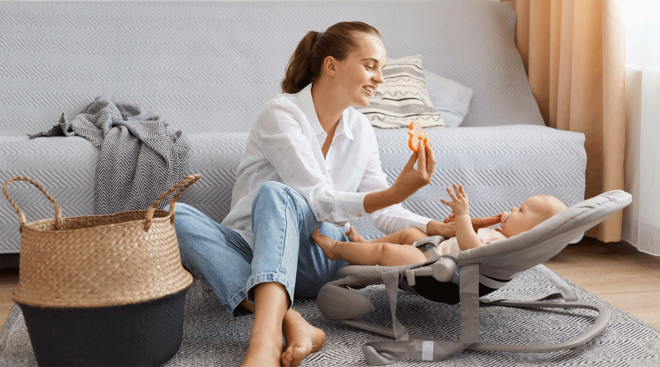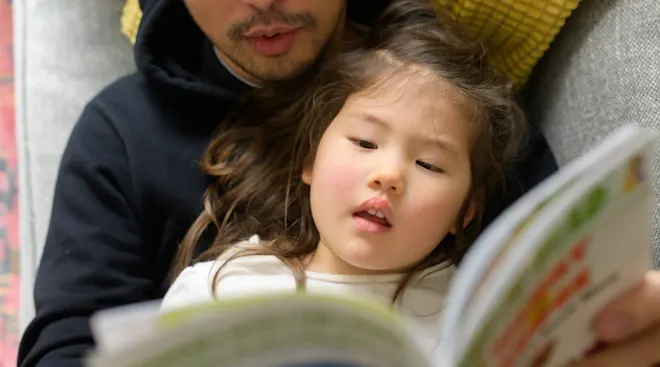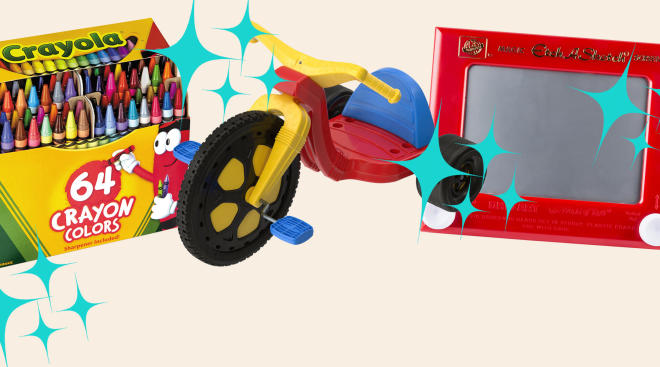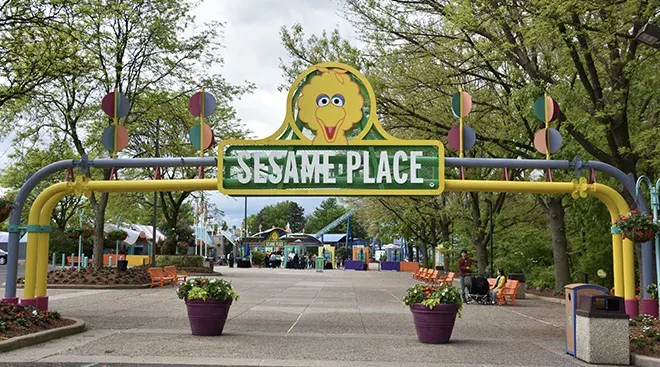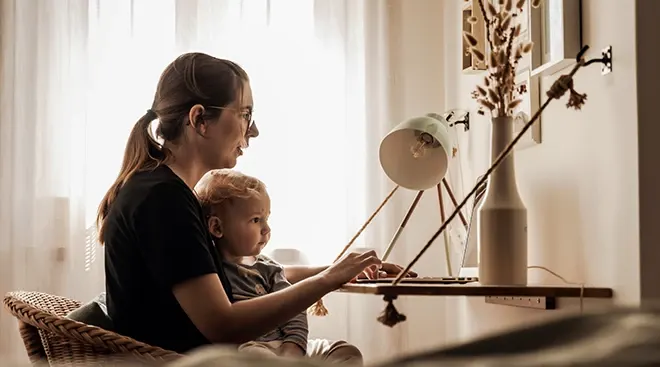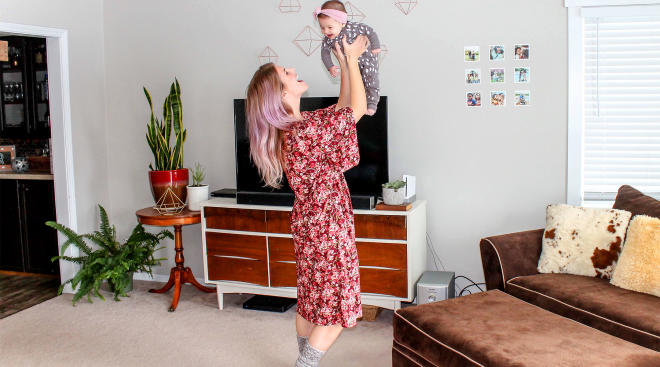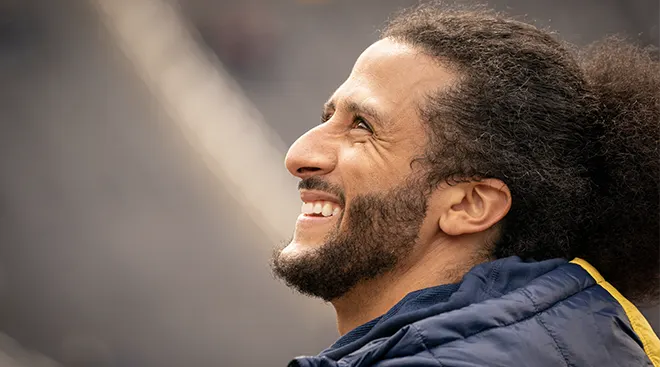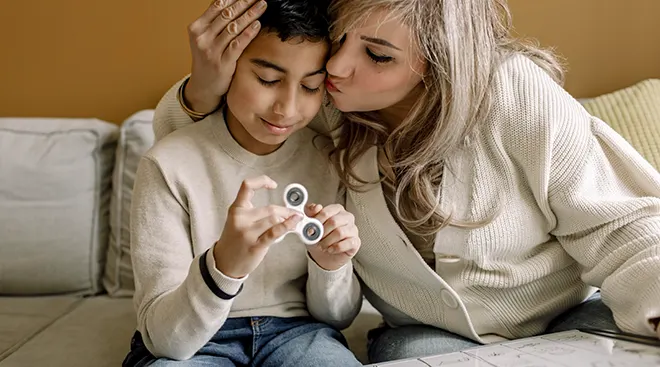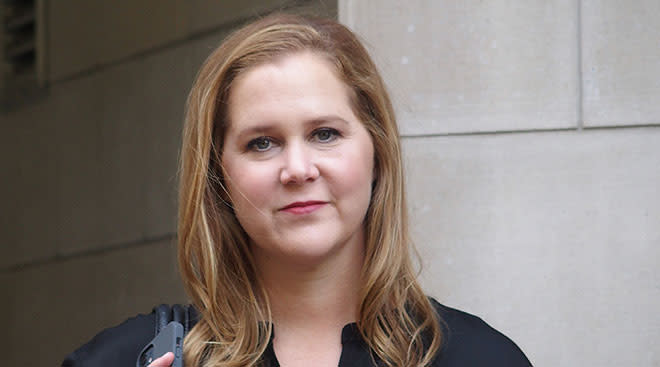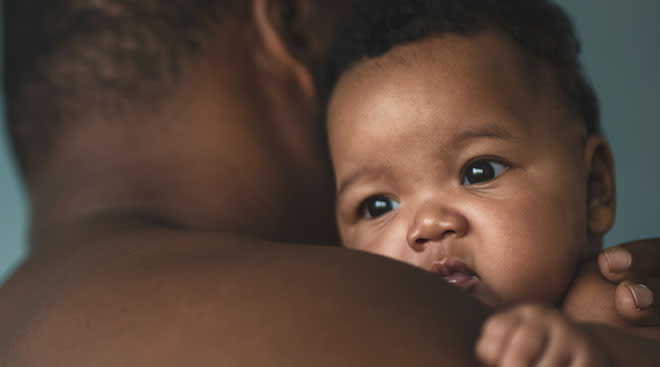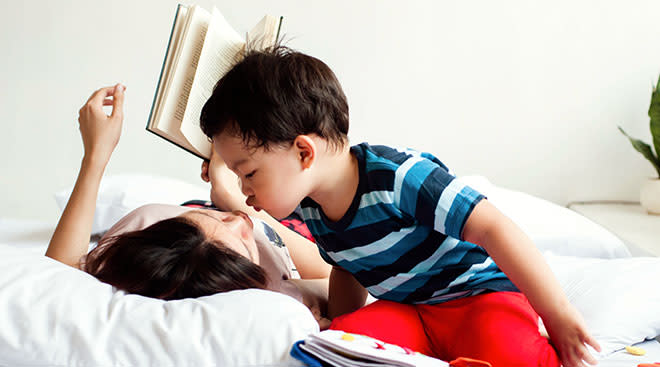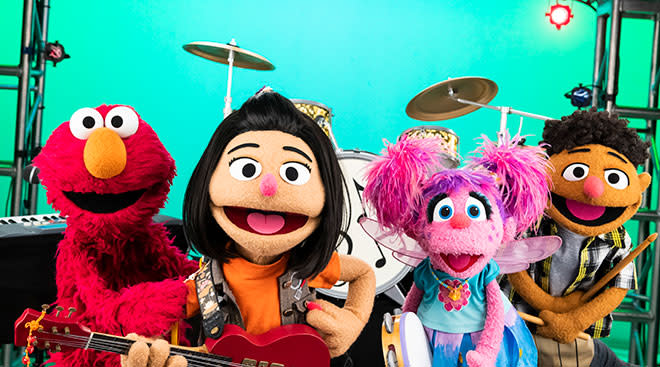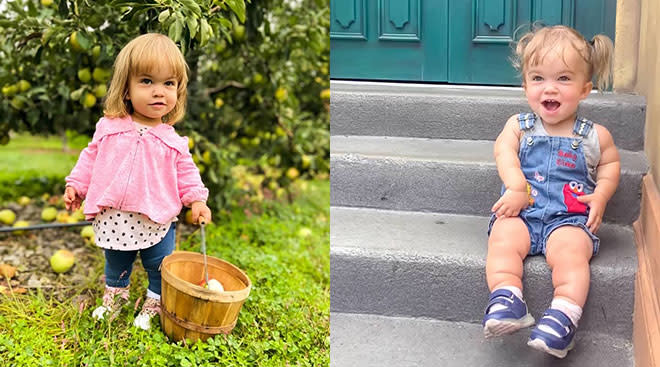White Mom Shares How She's Striving to Raise Anti-Racist Kids
After my son was born and my husband went back to work, I was desperate to connect with other new parents in my neighborhood. I ended up starting a “new moms/parent happy hour” at a local restaurant, where every Wednesday at 3 p.m. about 15 to 20 of us would have a glass of wine and talk. Some of us would be breastfeeding or hoping their baby would sleep long enough to finish a conversation. As a white woman, married to a white man, I thought the most beautiful thing about our happy hour was that we were a reflection of our Harlem community. There were parents of different races and religions, gay parents and single parents all connected by day drinking and the shared experience of having a newborn (and the privilege of parental leave). That happy hour is where I met my closest friends-turned-family who are now the foundation of my village and happen to be different races than my family.
As the daughter of two retired psychologists and former hippies (I know), I was raised with an awareness of structural inequity. For some reason, this concept seems to be controversial among white people. While I encourage everyone to read more extensively on this issue, for the purposes of this article, I’ll give you the cliff notes.
First, systemic racism exists. You can’t line up next to someone, knock them over, give them weights to carry and then expect them to walk as far as you. That’s (an oversimplification of) structural racism. From education to housing to healthcare, this country has systemically prevented Black, Indigenous and People of Color (BIPOC) from having the same opportunities as white people. It didn’t stop after slavery or the civil rights movement, it just shifted and became somewhat less obvious yet just as insidious.
Second, there’s no “I’m not racist” anymore. You are either part of the solution or part of the problem. “Neutrality” signals to other people, especially our children, that systemic racism is okay. If you’ve heard the term “anti-racist,” it simply means that you understand this dynamic and are doing your part to dismantle the systems that have excluded and oppressed BIPOC for generations.
As white people, and especially parents, we have a responsibility, now more than ever, to make anti-racism, inclusion and diversity a priority in our decision-making. How can we do that? While this will be different for everyone, one thing all of us white parents can do is talk to our kids about race. They are never too young, and there are loads of resources for us white parents on how to navigate challenging conversations around race. (I’ve listed some at the end of the article.) Diversifying your kids’ books and toys is a great place to start. But more powerful than all the books in the world is seeing their adult(s) in action. This is about us.
As white people, we cannot begin to comprehend the lived experiences of our BIPOC friends. It’s also not their job to educate and inform us—we can do a lot of the work ourselves. We know that one individual can’t solve racism, but if we all start taking steps and making changes, it will make a difference. Here are some ideas that we can all incorporate in our own way and in our own communities.
Read, read, read!
Seek out BIPOC authors and read! Read fiction and non-fiction. Learn about another culture’s history and experiences. We are all a collection of our stories and can learn so much about each other by listening to each other’s voices.
Spend your money
I know Amazon can make our lives crazy-easy sometimes, but try to be thoughtful with your purchases when you can. Seek out BIPOC businesses and vendors. When you have good experiences, promote and recommend those businesses to your friends and on social media.
Look around
Whether you live in a diverse community or not, look around. Do you know the people of color in your community? Are there issues in your community that don’t impact you directly but do impact people of color? Make it your problem! Advocate for other peoples’ children as you would for your own. If you don’t live in a diverse community, why not and what can you do about it?
Get uncomfortable
Don’t shy away from a question you’re not sure how to answer or pretend race doesn’t exist. If your kids are like mine, they ask questions ALL THE TIME! You may not always know how to respond (I definitely don’t), and that’s okay. Own it. Don’t let it stop you from identifying race and racism and talking about it with your kids.
A few years ago, my kids and I stopped to watch a group of break-dancers. As they pulled in some spectators for a stunt, one of the performers, who was a Black man, got into position and said, “this is the fastest you’ll ever see a Black man run without being chased by the police!” My son instantly turned to me and asked why he said that. Why would the police chase him? Why do police chase Black men? I could feel the people standing near us watching me as I contemplated my response. I told my son, who was around 4 at the time, that too often, police officers think that someone has done something wrong because they are Black.
I tried to give an example he could relate to: What if you and O (his best friend who is Black) were having a playdate with a babysitter who didn’t know either of you very well. While you were playing together, you accidently broke a picture frame, and when the babysitter came in, they immediately blamed O and gave him a time-out for breaking the frame. We talked about how that wasn’t fair and how there are a lot of systems in this country like that.
He was soon asking to get ice cream, while I replayed the conversation in my mind for the rest of the day. I don’t know if I got that one right, but I do know that, now, that conversation has become one of many we have had about how BIPOC are treated unfairly by law enforcement and the criminal justice system. These conversations are difficult and can be incredibly awkward, even with your own kid. But it’s a privilege to stress about an uncomfortable conversation rather than my child’s or husband’s personal safety.
Empathize
As a white woman married to a white man with white children, I will never know the same fear that BIPOC mothers and spouses experience when their loved ones are out in the world. But we all know fear, and we all know that Black people, especially men and boys, are far more likely to be killed or incarcerated simply because they are Black. Acknowledge this. Understand that BIPOC families may approach parenting differently than you for their own reasons. Extend your compassion without judgment. Tamir Rice was 12 years old, playing in a park. In less than five seconds he was killed by a police officer. Has your child ever done what you asked in five seconds? As white parents, we take our children’s overall safety for granted and need to recognize that that is a privilege that BIPOC parents do not enjoy.
Our lives as adults and as parents are a series of decisions and choices. As white people, we can still choose not to acknowledge the glaring inequities that exist in this country. Or we can choose to pull up, step up and do something about it, and raise our kids to do the same.
This is not an exhaustive list, just some preliminary suggestions.
Adult Reading
Non-Fiction
-
How to Be An Antiracist, by Ibram X. Kendi
-
The Warmth of Other Suns, by Isabel Wilkerson
-
Caste: The Origins of Our Discontents, by Isabel Wilkerson
-
Just Mercy, by Bryan Stevenson
-
Between the World and Me, by Ta-Nehisi Coates
-
I’m Still Here: Black Dignity in a World Made for Whiteness, by Austin Channing Brown
Fiction
- The Underground Railroad, by Colston Whitehead
- Americanah, by Chimamanda Ngozi Adichie
- Behold the Dreamers, by Imbolo Mbue
- An American Marriage, by Tayari Jones
- Transcendent Kingdom, by Yaa Gyasi
Media
Instagram Accounts to Follow
Tamara Tucker is a married mother of two children, ages 5 and 7, living in Upper Manhattan, New York City. She is the chief development officer for an educational non-profit in Brooklyn and previously was a college access counselor at a Title 1 school in Brooklyn.
Please note: The Bump and the materials and information it contains are not intended to, and do not constitute, medical or other health advice or diagnosis and should not be used as such. You should always consult with a qualified physician or health professional about your specific circumstances.
Navigate forward to interact with the calendar and select a date. Press the question mark key to get the keyboard shortcuts for changing dates.
































